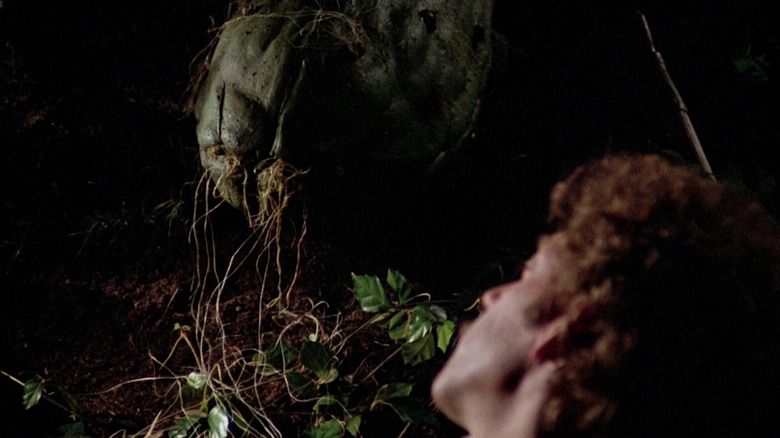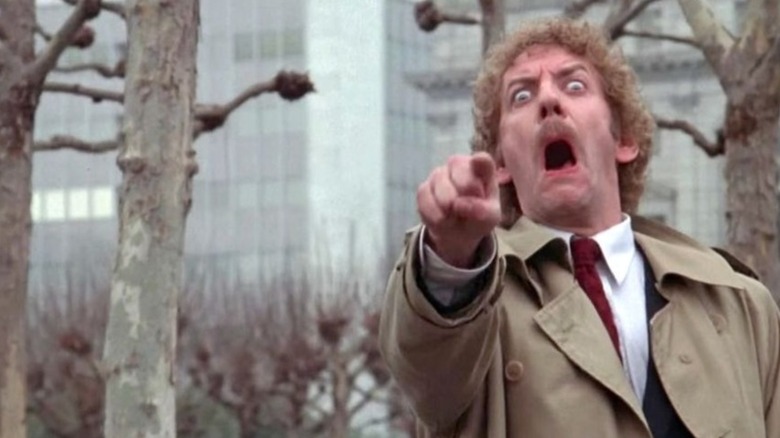Apple TV's Pluribus Is The Latest Secret Remake Of A Sci-Fi Classic
Spoilers for episodes 1-2 of "Pluribus" follow.
Vince Gilligan's "Pluribus" has debuted with a knock-out two episode premiere. While "Better Call Saul" star Rhea Seehorn gets top billing as Carol Sturka, we only meet her about 20 minutes into the first episode, "We Is Us." Before that, the show depicts various scientists investigating a signal transmitted from space (specifically planet Kepler 22b).
Carol is not one of these scientists; she's a romance author from Albuquerque (where "Better Call Saul" and parent show "Breaking Bad" were also set). Why are we following her? Because she's one of the few people in the world immune to the results of the signal: a virus that links people together into a hive mind of blissful, overly considerate drones. The hive treats Carol with only kindness and respect, but she's not having it, especially since the hive never conceals that they want Carol to join them.
When talking to other remaining individuals in episode 2, "Pirate Lady," Carol calls the hive "Pod People." That phrase is "Pluribus" nodding to one of its big influences: "Invasion of the Body Snatchers." First told as a 1955 novel, "The Body Snatchers" by Jack Finney, the story has been adapted to film four times. The movies all tell the story of alien invaders duplicating and replacing human beings. In the original story, the body snatchers are plant-based lifeforms grown from enormous pods, hence "Pod People."
A Pod Person retains the original's memories but feels no emotion, and with that the original personality fades away. In 1956's "Invasion of the Body Snatchers," the Pod People sell the transformation like this: "Reborn into an untroubled world [...] Love, desire, ambition, faith, without them life's so simple." Protagonist Dr. Miles Bennell (Kevin McCarthy) counters that it's a world where everyone's the same.
Pluribus is the latest riff on Invasion of the Body Snatchers
Director Philip Kaufman's 1978 "Invasion of the Body Snatchers" remake features Leonard Nimoy (in one of his best non "Star Trek" performances) as Dr. David Kibner, one of the chief Pod People. He paraphrases the original film's line: "You'll be born again into an untroubled world, free of anxiety, fear, hate... There's no need for hate now, or love."
Compare that with the "Pluribus" hive, which feels only love. They can't even kill a housefly. They promote their joining by saying it'll make everyone happier to be part of one mind. Still, the opening scenes of "Pirate Lady" show how the hive acts when no individual is around: the drones move quietly and efficiently, not sparing a moment to talk or show emotion. It's a similar sight to the ending of the '78 "Body Snatchers," when the invasion has succeeded and the pod people rule San Francisco. They all go about their day with quiet dispassion, staying silent and wearing faces that, in their lack of expression, reveal the soulless drones that they are.
Carol is the Dr. Bennell of this "Invasion," using the same arguments about the merits of individuality. When the other individuals don't want to set things back, she calls them "traitors to the human race." Though the signal containing the virus recipe was extraterrestrial, the hive stresses that they aren't aliens. They're still people, just with their minds linked. It's a new intelligence, but one made from the sum of existing human beings. Conversely, the Body Snatchers aren't a hive mind, at least not the kind depicted in "Pluribus." That's why they scream to let others of their kind know when someone is really a human pretending to be a Body Snatcher.
Why Invasion of the Body Snatchers endures
If the Body Snatchers were a hive mind, then they could tell if someone is or isn't in the hive by just looking at them and then not hearing their thoughts. They have more of a spiritual collectivism, and their screams are a horrible sound reflecting how us humans shame others for nonconformity. Emotion is the foundation of individuality; we feel or react to a world in different ways, which then influences how we act. Since the Body Snatchers have no emotion, they function as pieces of a whole.
That's why the original "Body Snatchers" is most often interpreted as a Red Scare panic picture. Under this reading, the Body Snatchers represent the dangers of communism and how it supposedly erases individual liberty and free thought.
Even so, "Body Snatchers" is an extremely flexible allegory. The invaders can stand in for just about any ideology or social ill. The '78 version tied into the era's larger feelings of paranoia and distrust, while Abel Ferrera's 1993 "Body Snatchers" set itself on a military base, comparing the invasion to the tendrils of the military industrial complex woven into American life. John Carpenter's "They Live," which depicts the yuppie capitalism of the 1980s as the work of alien invaders, is a spiritual "Body Snatchers" remake.
So too is "Pluribus," because we haven't cured the ills of groupthink in 2025. Yet with how divided and in conflict our world is now, a harmonious whole where everyone is polite and working towards a common good can sound tempting. Whenever that temptation arises, let's all remember to be a Carol.
"Pluribus" episodes 1-2 are streaming on Apple TV, with new episodes releasing on Fridays.


